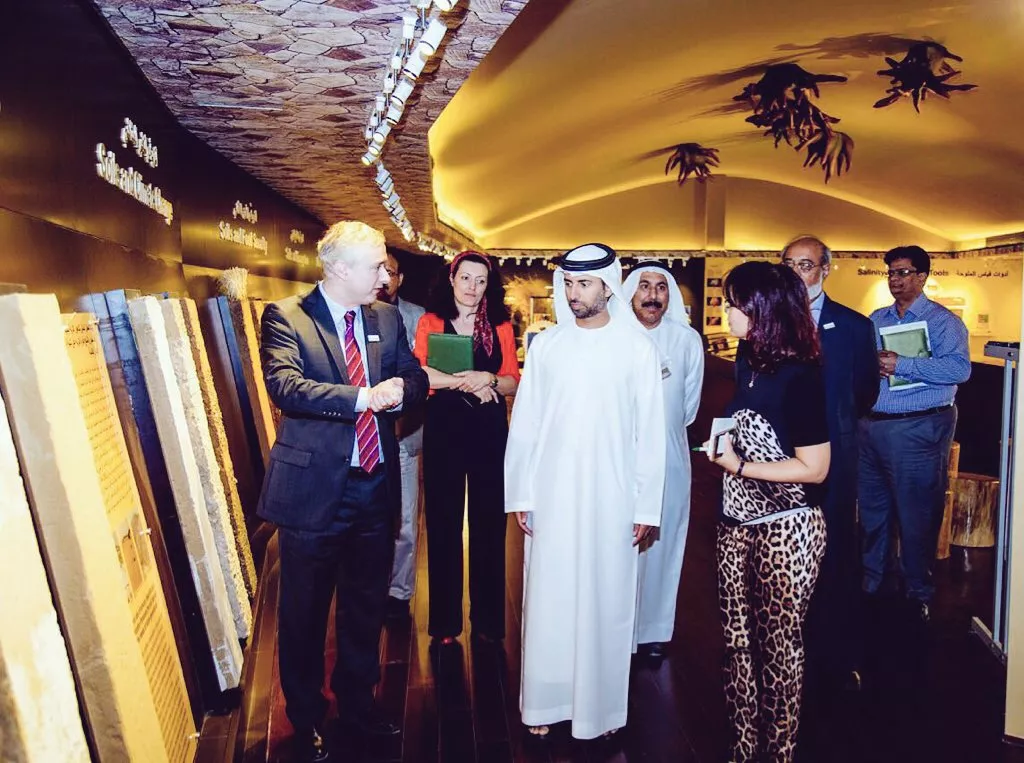UAE Energy Minister visits International Center for Biosaline Agriculture
13 June 2016
A delegation led by UAE Minister of Energy H.E. Suhail Mohamed Faraj Al Mazrouei visited today the Dubai-based International Center for Biosaline Agriculture (ICBA) to learn about the Center and its work on, among other things, water-efficient technologies and crops, non-conventional water resources, and biofuel crops such as Salicornia. This visit is one of a series of visits by the Minister of Energy to local organizations working on energy issues to enhance communication and improve cooperation between the Ministry of Energy and its strategic partners, as well as discuss mutual cooperation opportunities for diversifying energy resources for sustainable development.
Accompanied by senior officials from the Ministry, H.E. Suhail Mohamed Faraj Al Mazrouei was received by Professor Abdulrahman Sultan Alsharhan, Chairman of ICBA Board of Directors, and Dr. Ismahane Elouafi, ICBA’s Director General.
During the visit, H.E. Suhail Mohamed Faraj Al Mazrouei also met ICBA’s senior staff and scientists, and was briefed about the Center’s research efforts in such areas as natural resources management, climate change adaptation, crop productivity and diversification, aquaculture and bio-energy, and policy analysis in marginal environments.
H.E. Suhail Mohamed Faraj Al Mazrouei heard about the Center's activities on reducing water consumption by agricultural systems in marginal environments, while maintaining or improving agricultural production. In particular, researchers at ICBA work on solutions by analyzing systems that reduce losses and optimize beneficial use of resources (e.g. integrated food-forages systems, integrated aquaculture-agriculture systems) and by crop selection of drought-resistant varieties.
H.E. Suhail Mohamed Faraj Al Mazrouei also toured ICBA’s research facilities, including experimental fields on date palm, Salicornia, the Integrated Aqua-Agriculture System, the Soil Museum, greenhouses and net-houses, and the SCADA system.
H.E. Suhail Mohamed Faraj Al Mazrouei said: “The scope of research expertise and activities carried out by ICBA in cooperation with several local organizations is impressive, especially in the field of water security. As water use efficiency remains a priority in the UAE, I am pleased to learn that the Center focuses considerable efforts on developing and introducing water-efficient crops and technologies.” The Minister noted that the Ministry of Energy will develop a clear strategy to make the most of every drop of water in coordination and cooperation with relevant organizations to increase water supply in the country.
The Minister also noted that it is important to consider using marginal water resources like saline water, brine water, and waste water as there is growing pressure on freshwater resources in the region. It is also necessary to improve management of groundwater resources, the Minister added.
Speaking at the meeting, Professor Abdulrahman Sultan Alsharhan said: “It is our pleasure to welcome H.E. Suhail Mohamed Faraj Al Mazrouei at the Center. We discussed opportunities for collaboration in different areas related to water and agriculture between ICBA and the Ministry.”
Dr. Ismahane Elouafi said: “We place special emphasis on integrated natural resources management solutions in marginal environments. In particular, our scientists have evaluated different protected agriculture solutions, where water and energy consumption in plastic houses is compared to that of net-houses, and yields are compared. Environmental impact and economic aspects are also evaluated. This research shows that net-houses can reduce energy consumption by 80-90% and water by 70-75% while maintaining high production levels.”
Dr. Ismahane Elouafi added that the Center also works on the integrated agriculture-aquaculture system (IAAS) that aims to find sustainable solutions to dealing with the brine waste generated by the growing number of desalination units set up by farmers in the region.
Scientists study sustainable uses for brine (e.g. aquaculture, seaweed and beneficial algae) followed by reusing the nutrient-rich brine to irrigate halophytic plants grown for forages and biofuel production. This system is scalable and can be applied to small-scale water treatment units used in the region, as well as in large-scale desalination plants used in the Gulf region. These integrated systems balance the need for energy and water with the production of food, thus increasing the resilience of the overall system while at the same time providing a variety of nutritional sources.











